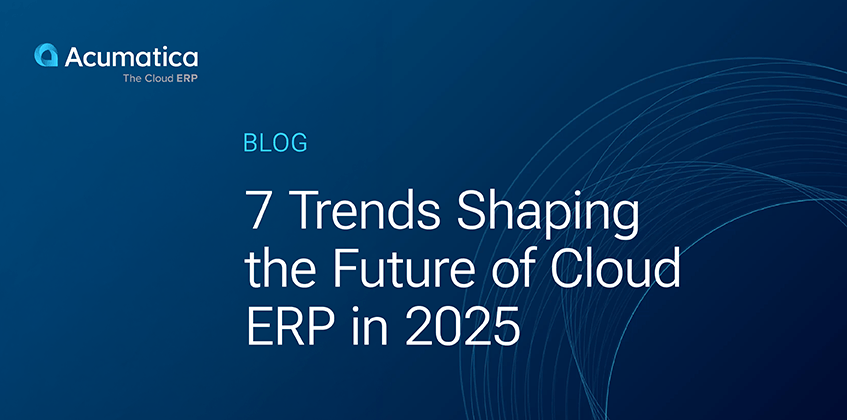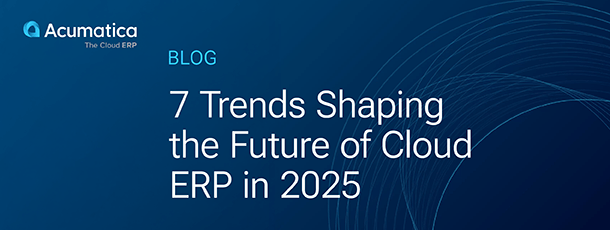Intro

The cloud ERP landscape is undergoing a significant transformation, driven by rapid advancements in artificial intelligence, automation, and evolving business needs. As businesses continue to adapt to increasingly complex and competitive markets, ERP systems are no longer just about streamlining operations—they are becoming intelligent, proactive systems that anticipate business needs and drive strategic decision-making.
In 2025, we expect to see major shifts in how businesses adopt and optimize cloud-based ERP solutions. From the rise of agentic AI to the increasing importance of cybersecurity and usability, these trends will shape how businesses operate and compete in the years ahead. To explore these changes, we asked leading industry experts to share their insights on the key trends that will define the future of cloud ERP.
The Rise of Agentic AI in Cloud ERP

David Linthicum
Founder/Lead Researcher, Linthicum Research
LinkedIn
Agentic AI will have the most significant impact on the evolution of cloud ERP in 2025. Businesses are shifting away from passive applications that provide static behavior to intelligent software that operates proactively and dynamically. Agentic AI will enable ERP systems to anticipate business needs and carry out solutions before users are even aware of the problem. This shift will empower business users by automating decision-making, streamlining operations, and providing a more tailored and responsive ERP experience. Ultimately, agentic AI will help businesses become more adaptive and competitive by allowing humans to focus on strategic thinking rather than manual problem-solving.
Addressing Cloud ERP Adoption Challenges

Eric Kimberling
CEO, Third Stage Consulting
LinkedIn
One of the biggest challenges of cloud-based ERP adoption is that businesses often have to adjust their operations to fit the software rather than the other way around. This can lead to significant disruption and require careful change management. High recurring costs and vendor lock-in also present long-term challenges to flexibility and ROI. To overcome these issues, organizations should conduct thorough due diligence, negotiate contracts carefully, and develop a strong change management strategy. Aligning ERP systems with business needs while maintaining control over digital strategy will be key to maximizing value and avoiding costly missteps.
Practical AI for ERP Accuracy

Sanket Akerkar
Chief Revenue Officer at Acumatica
LinkedIn
There are many exciting developments in technology, and 2025 will be the year where businesses assess how these new innovations best fit their organizational needs. Technology needs to be practical and valuable to the end user so they can actually take advantage of artificial intelligence. If you’re running an ERP solution, you want everything to be precise and accurate. An ERP system is not meant to be an approximation. You want the invoice amount, you want the customer’s address, you want to know if the product is in stock, the field service rep needs to show up at the right place, at the right time, with the right tool. So, how do you apply AI in that framework? With the dramatic changes taking place in AI, it’s vital for vendors to give the end user tools to design and do what they need to do in the context of AI with large language models in a way that not only delivers precision and accuracy, but also best serves their business, their employees and their customers.
Cybersecurity and Data Protection in Cloud ERP

Shelly DeMotte Kramer
Founder + Principal Analyst, Kramer & Co.
LinkedIn
With the rise of cyber threats, businesses need to prioritize robust cybersecurity measures within their cloud ERP platforms. Identity and access management (IAM), data protection protocols, and data loss prevention (DLP) tools should be foundational components of every ERP system. Automated patch management and real-time threat detection systems will be essential for preventing vulnerabilities and minimizing downtime. Continuous monitoring and automated response capabilities will provide an additional layer of security, while strong backup and recovery solutions will ensure business continuity. In 2025, cybersecurity will no longer be a “nice to have”—it will be a business imperative.
AI and Automation as a Competitive Advantage

William McKnight
President, McKnight Consulting Group
LinkedIn
AI and automation will become major competitive differentiators for businesses using modern ERP systems. The next generation of ERP platforms will integrate AI-driven predictive analytics, real-time reporting, and automated workflows, allowing businesses to operate with near-complete automation. AI will streamline complex approval processes and exception handling, reducing operational friction and increasing efficiency. Natural language interfaces will become the standard method for accessing ERP data, making it easier for non-technical users to retrieve insights and take action. Companies that leverage AI and automation effectively will gain a substantial operational and strategic advantage.
AI-Enabled Customization and Industry-Specific Solutions

Shawn Windle
Founder and Managing Principal, ERP Advisors Group
LinkedIn
AI is transforming how ERP systems are developed and customized. In 2025, AI will enable ERP vendors to rapidly add industry-specific functionality at a scale and speed that was previously impossible. Some vendors, like Acumatica, are now enabling their platforms to run third-party, industry-specific solutions natively—providing businesses with the best of a world-class ERP platform and micro-vertical functionality. This means businesses no longer need to settle for general-purpose ERP systems. Instead, they can adopt solutions that are tailored to their unique industry needs, accelerating time to value and increasing operational efficiency.
Conversational AI for Improved Usability

Simon Chan
Managing Partner, Technology Business Partners
LinkedIn
ERP systems manage vast amounts of data, but accessing insights has traditionally required navigating complex menus and using technical commands. Conversational AI will change that. In 2025, natural language interfaces will allow business users to interact with ERP systems using everyday language. This will make data more accessible and insights more actionable. By removing the technical barriers to data access, conversational AI will improve usability, increase adoption, and empower business users to make faster, data-driven decisions.
How Businesses Can Stay Competitive in the Future of Cloud ERP
Cloud ERP is evolving rapidly, and the trends shaping its future reflect a broader shift toward more intelligent, proactive, and secure business systems. Agentic AI is transforming how businesses interact with software, while AI-driven automation and predictive analytics are increasing efficiency and reducing complexity. At the same time, improved cybersecurity, enhanced customization, and conversational AI are making ERP platforms more accessible and adaptable to business needs.
The businesses that thrive in 2025 will be those that embrace these trends and align their cloud ERP strategy with their broader operational and strategic goals. By adopting AI, improving security, and enhancing usability, companies can turn their ERP systems into a true competitive advantage.
 Canada (English)
Canada (English)
 Colombia
Colombia
 Caribbean and Puerto Rico
Caribbean and Puerto Rico
 Ecuador
Ecuador
 India
India
 Indonesia
Indonesia
 Ireland
Ireland
 Malaysia
Malaysia
 Mexico
Mexico
 Panama
Panama
 Peru
Peru
 Philippines
Philippines
 Singapore
Singapore
 South Africa
South Africa
 Sri Lanka
Sri Lanka
 Thailand
Thailand
 United Kingdom
United Kingdom
 United States
United States


